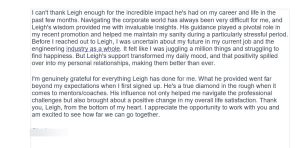Where once we could only see problems, simply by changing state, we can often be amazed how, like droplets of dew melting on a sunny day, they vanish as we are presented with solutions.
Image by Jörg Möller from Pixabay

Where once we could only see problems, simply by changing state, we can often be amazed how, like droplets of dew melting on a sunny day, they vanish as we are presented with solutions.
Find more of my self-help products in my Shop. Click HERE

It was SO rewarding to receive this thoughtful testimonial from one of my clients, today, the first day of the new year.

Imagine you’re driving along in your car, oblivious to the subtle signs of wear and tear. Initially, everything seems fine, but gradually you notice it’s not running as smoothly as it should.
This can be much like the journey you’re on in your professional life, especially if you’re navigating the complex world of engineering or other high-demand career.

Imagine you’re driving along in your car, oblivious to the subtle signs of wear and tear. Initially, everything seems fine, but gradually you notice it’s not running as smoothly as it should.
This can be much like the journey you’re on in your professional life, especially if you’re navigating the complex world of engineering or other high-demand career.

As a high-achieving professional, you understand the critical importance of skills like logical reasoning and technical know-how, especially in fields like engineering. These are the cornerstones of problem-solving and innovation.
Yet, there’s another skill just as vital, yet not as visibly celebrated: emotional intelligence (EI).

The journey of an engineer is often perceived as a linear path: acquire a degree, land a technical role, and then climb the corporate ladder within the engineering sphere.

The journey of an engineer is often perceived as a linear path: acquire a degree, land a technical role, and then climb the corporate ladder within the engineering sphere.
However, the reality is far more dynamic and, in many cases, unconventional. Recent insights reveal that only about 60% of qualified engineers in Australia remain in engineering roles, with a significant number transitioning to non-engineering sectors.

Self-awareness can indeed contribute significantly to a person’s success, especially in professions like engineering and other high-income professional roles that demand a range of persona skills. Here are a few reasons why

This might be a good time of year to reflect on how well you have been going in your work, career or business over the past 12 months or so.

This quote, seemingly lighthearted, carries profound insights about life’s journey and personal goals.

Navigating the world of professional and personal development can be a complex journey. As an individual seeking growth, understanding the different approaches available can greatly enhance your path to success. This article delves into the distinct realms of my Therapeutic Mindset Coaching, Conventional Coaching, and Mentoring, each offering unique benefits tailored to various needs.
Please note that, at times, I provide links to free and paid products that you might find useful as you strive for greater success in your work or business life.
I also recommend resources by others that you might find of value. It is important to mention that I only recommend products that I have had satisfactory, or better, personal experience with or, otherwise have good reason to recommend them.
Please note that some of these links are affiliate links, in which case I might receive some form of remuneration if you purchase the product using my link. While this will not add to your cost, any payments received in this way will assist in keeping this site running to help people such as yourself.
We use cookies to ensure that we give you the best experience on our website. If you continue to use this site we will assume that you understand and accept this along with our terms and conditions, shown here.
Fill in your details and download it now